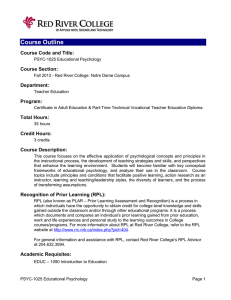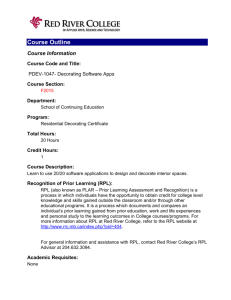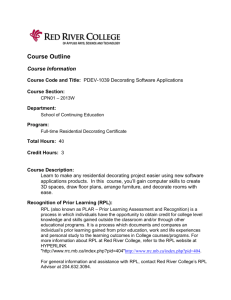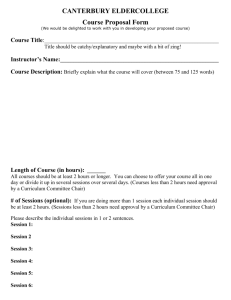Course Outline - RRCTeacherEducation
advertisement
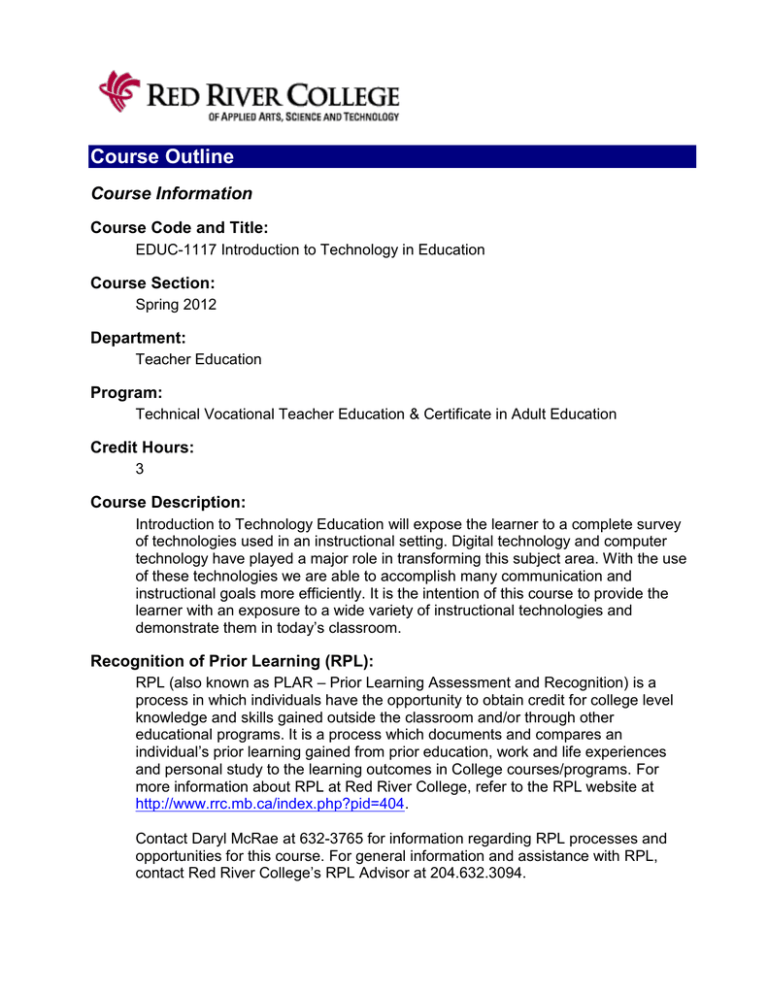
Course Outline Course Information Course Code and Title: EDUC-1117 Introduction to Technology in Education Course Section: Spring 2012 Department: Teacher Education Program: Technical Vocational Teacher Education & Certificate in Adult Education Credit Hours: 3 Course Description: Introduction to Technology Education will expose the learner to a complete survey of technologies used in an instructional setting. Digital technology and computer technology have played a major role in transforming this subject area. With the use of these technologies we are able to accomplish many communication and instructional goals more efficiently. It is the intention of this course to provide the learner with an exposure to a wide variety of instructional technologies and demonstrate them in today’s classroom. Recognition of Prior Learning (RPL): RPL (also known as PLAR – Prior Learning Assessment and Recognition) is a process in which individuals have the opportunity to obtain credit for college level knowledge and skills gained outside the classroom and/or through other educational programs. It is a process which documents and compares an individual’s prior learning gained from prior education, work and life experiences and personal study to the learning outcomes in College courses/programs. For more information about RPL at Red River College, refer to the RPL website at http://www.rrc.mb.ca/index.php?pid=404. Contact Daryl McRae at 632-3765 for information regarding RPL processes and opportunities for this course. For general information and assistance with RPL, contact Red River College’s RPL Advisor at 204.632.3094. COURSE DELIVERY METHODS: Classroom / Computer Lab The following communication tools will be used in this course: Email, Google Chat, SharePoint COURSE FORMAT: Demonstration/lecture and examples will be provided as required. Some class time will be spent working on daily assignments and projects but students will be required to complete assignments and projects outside of scheduled class time. EFFECTIVE DATE: June 11, 2012 INSTRUCTOR INFORMATION: Instructor’s Name: Eva Brown Email: ebrownorama@gmail.com; ebrown38@rrc.ca Office hours: by appointment STUDENT READINESS TECHNOLOGY & EQUIPMENT READINESS: Computer access Internet access Flash Drives STUDENT COMMITMENTS AND CONTACT TIMES: Students are required to attend all scheduled class time. Class discussions and activities often account for a significant part of student assessment, thus these experiences cannot be replicated by a “take-home” or “make up” assignment. In addition to regular class time students should expect to spend 2-3 hours outside of each class reading and preparing written/practical assignments. If you are a student with a disability and require reasonable accommodations, you are encouraged to discuss this privately with your instructor to facilitate greater understanding of your learning needs. To receive accommodations, you also must connect with Counselling and Accessibility Services who will assist in developing and implementing your accommodation plan. You can contact Counselling and Accessibility Services in person at NDC (D102) or EDC (P210) or by filling out the online intake form which can be found on our website at: http://www.rrc.mb.ca/index.php?pid=706. For further information about RRC’s accommodation process, see the Handbook for Students with Disabilities at: http://www.rrc.mb.ca/files/file/disabilities/handbook.pdf STUDENT LEARNING LEARNING OUTCOMES: Upon completion of this course, each student should have the knowledge, skills and attitudes to: 1. 2. 3. 4. 5. 6. Develop and define a consistent rationale for using instructional technology in education and/or training. Recognize collaborative workspaces and appropriate strategies to manage massive amounts of information. Recognize and select instructional and assistive technologies on the basis of specified audience needs. Demonstrate a sound understanding of technology operations and concepts. Demonstrate a positive attitude toward instructional technologies by utilizing more of them in your teaching/training, than you have previously. Analyze and evaluate the effectiveness of a lesson presentation using instructional technology using the ASSURE Model. ASSESSMENT AND EVALUATION: Assessment Weight Projects --Best practices in educational technology 30% Assignments—The e-classroom, teaching resources 30% Microteaching and Lesson Plan 30% Professionalism (must attend all 5 days & participate in discussions) 10% Total: 100% LETTER GRADE DISTRIBUTION A+ 4.5 90 - 100% A 4.0 80 - 89% B+ 3.5 75 - 79% B 3.0 70 - 74% C+ 2.5 65 - 69% C 2.0 60 - 64% D 1.0 50 - 59% F 0.0 0 - 49% COMPUTER LAB ACCESS Various computer labs are located throughout both the Notre Dame and Princess Street Campuses. Labs are available for general use when not scheduled for class use. Schedules are usually posted on the lab door. Labs may be accessed after hours through college security. If you require the use of specific computer programs, please consult your instructor for appropriate lab locations. Food and drinks are not permitted in any of the computer labs. Your instructor will advise you of the rules and regulations regarding proper lab conduct, or you may refer to Policy A29 – Acceptable Use of Computer Facilities. Course Policies Research shows that regular attendance is a strong predictor of academic success and is expected in all programs. In terms of attendance, one percent will be deducted from your final course grade for each day absent after an initial grace of 2 absences; 3 lates (over 15 min) will equal one absence. General Policies Use of cell phones, pagers, and headsets is not allowed during class or in any test or exam room. Any student accessing the Internet (e.g. MSN Messenger, Facebook, e-mail, games) without instructor approval may be asked to leave a classroom. All assignments must be submitted by their specified due dates. Failure to complete an assignment by its due date will result a mark of zero (0) for that assignment. Absence for any cause in no way relieves learners of their responsibility to complete all course work to the satisfaction of the instructor. Learners who are unavoidably absent or late because of illness or some other acceptable cause are still responsible for class work or assignments missed. Learners must advise their instructor or Chair and make alternate arrangements for handing in completed assignments. Medical certificates or other documentation may be required. Students absent from an exam without a valid reason acceptable to the Chair will receive a mark of zero (0) on that exam. No makeup test will be provided to students unacceptably absent for any scheduled term test or exam. Students unable to write a final exam due to illness or other unavoidable situation must notify the Chair as soon as possible, and provide the Chair with a written advisement within seven days of the exam date. Verification (e.g. physician's certificate) may be required. If approved by the Chair, a grade of DNW (Did Not Write) will be posted until the student has completed a deferred final exam. Instructors can refuse to return graded tests and exams to students. However, upon request, students may view major term examinations or final examination papers which have not been returned to them. All final examination papers will be kept by instructors for a minimum of one month into the next semester. Final exam results and course grades will not be released to students directly, and are not official until posted in Web Advisor. Changes may be made to this course outline with appropriate notification. Academic Integrity For any assignment, test, or exam, the copying of answers or files from another student, the providing of answers or files to another student, or the copying and pasting of information directly from the Internet without proper reference, is a violation of academic integrity and may lead to disciplinary measures. Refer to RRC policy S4 at www.rrc.mb.ca/files/File/policies/new/S4%20Academic%20Integrity.pdf. Additional Information/Frequently Asked Questions: Attendance, Use of Time, Participation Regular and punctual attendance, effective use of time, and participation are expected just as they will be required of you as a professional classroom teacher. They will form part of your grade - see Personal Management Skills. Other Students who are experiencing difficulty with the course are encouraged to make an appointment to discuss the situation with instructor. One piece of advice here . . . do not leave this appointment until the last hour (or worse yet, the last minute!). Respect for others is expected at all times. This includes listening to others, accepting others opinions, cooperating, etc. Always remember the reason you’re here—to become the best teacher you can—always strive toward that goal. Authorization: This course is authorized for use by: ___________________________ Chair, Teacher Education ©Red River College 2012 _____June 11, 2012___________ Date


